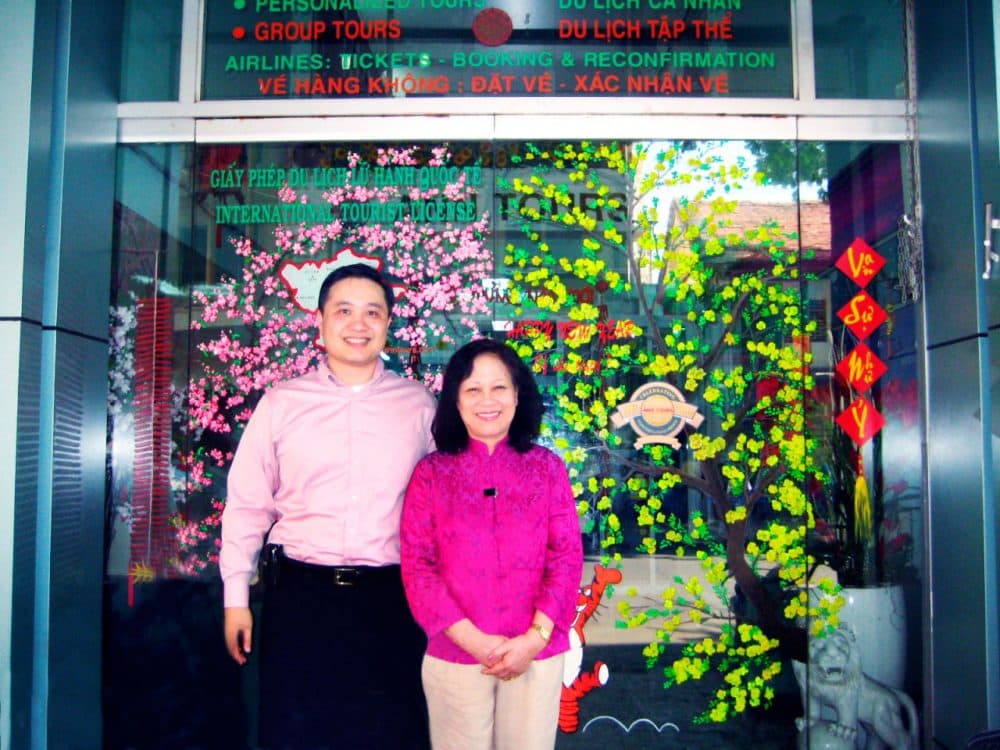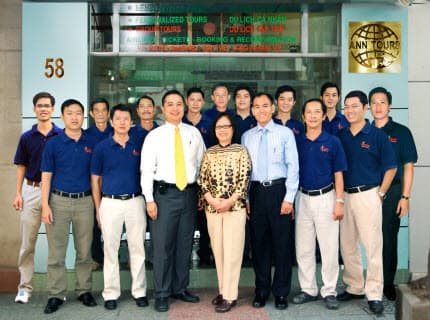Advertisement
How A City, And A Family, Have Changed Since The End Of The Vietnam War

President Barack Obama is in Vietnam this week, on his first trip to the country as president. He started off in Hanoi, and is now visiting Ho Chi Minh City, formerly known as Saigon, the capital of South Vietnam.
When the North Vietnamese captured Saigon in April 1975, it essentially marked the end of the Vietnam War. Tony Nong was living in Saigon at the time. He was seven, and his mother was working for the U.S. embassy.
Here & Now's Jeremy Hobson talks with Nong, now managing director of his family's travel company, Ann Tours, in Ho Chi Minh City, about what happened to his family in the years after the war ended, and how much Ho Chi Minh City — and Vietnam — have changed since then.

Interview Highlights: Tony Nong
What happened to you and your family when the Vietnam War was ending?
Well, it was exactly on the 18th of April in 1975, my mother Ann was working for the US Embassy. She thought it would be a good time to get the kids out of Vietnam. And so we all rushed to the airport waiting to get on one of the last military transports to leave Vietnam. When I woke up the next morning my mother was gone. She had snuck back to the city with my four year old sister, leaving my brother who is six years old, and I at the airport, thinking she was going to come back and catch the flight with us. But the aircraft landed and we never saw my mom and never saw Vietnam again for another sixteen years. We ended up in southern California in Camp Pendleton San Diego, through the help of the State Department they found my great aunt who was going on a student exchange program at Cal Polytechnic. That was our life in the United States. At the start of our life when we were six and seven. From then on when we lived with our Aunt, she said you immerse yourself in English and never speak Vietnamese again. From then on we never spoke a word of Vietnamese in of the house.
Advertisement
Fir sixteen years we lived in the U.S. with the 30th of April ending communication between both countries, I never got to know what happened to my mother.
And then many years later, you did hear from your mother. You got a phone call.
Yes, yes, I was at San Jose State University and at about 4 o’clock in the morning I received a phone call and the person at the other end said “this is your mother speaking.” It was the first time I had heard her voice after sixteen years.
And what had happened to her?
After 1975 she says the city was just all mixed over, life was different, you were on ration lines, ration food. The economy hasn’t changed. With the change, the slow movement of change towards what we call “doi-moi” was the significant change in about 1988-1989 where it means new change, where the government allowed private enterprise to flourish in the once Saigon Ho Chi Minh city. That was when my mom came up with the idea to try to open a travel agency to look for her sons. And the only thing she got started was an old sears refrigerator, that she had bought through the catalog during her time at the embassy. She sold ice water on the street corner to survive.
From then, she opened up a little book shop, it happened one day, travelers went through her shop. She was a history major so she took people around town showing people the history of the city of Saigon. From there, one day, a Vietnamese American had walked through her shop and asked her for help to do paperwork so he could marry his Vietnamese wife. She said I’ll do it for free if you promise me if you return to the U.S. you look for my sons. She gave him our name and picture.
Unbeknownst to us he lived in San Jose California. Of all the cities in the United States, he ended up in San Jose. I didn’t know at that time San Jose was one of the largest Vietnamese populations in the United States. So he looked us up in the phone book and he found my name. And at that time I was staying at the dormitory at San Jose State. He called me one day and he said “do you know this woman by this name?” It was the first time I had heard my mother’s name. I remembered what my aunt told us, to be very careful of people who were Vietnamese. He wrote a letter to my mom two or three weeks later via Canada because of the embargo, and in that letter it says to my mom “I think I found your sons.” So she ran to the old French post office right downtown and she made that very first phone call in 1989. She cried for fifteen minutes via Canada relay, and that was the first time we were reunited.
And you went back, you and your brother, both went back to Vietnam to visit. And a few years later you both decided to move back.
In 1993 after three visits, we thought our dream was to own our own businesses and to be together with our mom. We’ve been separated for so many years. So we decided to make that move back.
Being college graduates we thought that we could change the world and can take on anything, and it was a big lesson for us when we returned. The reverse culture shock. Living in the United States, being taught independence, returning home to Vietnam and being dependent on your family and getting around.
[President Obama] wasn’t here to try to push America’s democracy, but he was trying to say let’s build the relationship together.
Tony Nong
It wasn’t as quick as just a hop in a car and drive down the road or the mall or to somewhere to pick up something. Shops in Vietnam are located with different specialty shops in different parts of the city. That was a big change for us to be dependent. And also the motor bikes were surprisingly also a lot more than we could count. Crossing the street was one of the biggest feats that we had to learn when we returned to Vietnam. It’s just a simple tip, move forward and don’t step back.
The Vietnamese government remembers which side you were on so many decades ago. it can make it difficult for you to get jobs and to do certain things if you were with the Americans back then.
There was a time, after any war, there’s always a sense of suspicion. But I think one of the most positive parts, Vietnam as a country and as a people, knew how to heal as they move forward. The biggest change was in the 1990s.
Vietnam has become one of the manufacturing capitals of the world. How has it changed since you’ve been back in the 1990s?
I think the funny thing was that in 1995, when the embargo was lifted, free Pepsi and Coca-Cola was given out at the airport. It was something interesting, sort of a symbolic change in relations. I think the biggest change i saw in the city is the wealth of the people. Their income had increased. Cities became more organized instead of a market just being sold on the sidewalks all over, it was a more organized city where commerce and residence. Even in Vietnam until today, you find that there’s no residential area, anyone can just open up shop and make money, where before everyone was on ration lines and waiting to get handouts. I think that was the biggest process in the city itself. People having more.
How are people feeling about the president’s visit?
I can tell you, he’s treated like a rock star. People lined for miles on the streets and the road, just to see his motorcade come by. Especially the young people. Of all the three presidents who visited Vietnam, President Obama seemed to symbolize a person who persevered and pressed on. It gave the young people a lot of hope. And I think one of the things that amazed a lot of the Vietnamese people was when President Obama talked in front of an audience of 2000 students and entrepreneurs. He used quotes and poems from some of the most historic writers of Vietnam. He said it from his mind and people felt that he said it wholeheartedly and people felt it wasn’t scripted. I think that was one of the things that gained a lot of respect for a lot the Vietnamese. Now he’s in Saigon, where I think the showing in Saigon was more than in Hanoi. People felt a closeness to the U.S. than they were in the north because this was south Vietnam.
Do you think you’ll ever come back to the U.S. and live here?
I think I would come back to visit, but I’m trying to compare, would be better to be stuck on a freeway or be stuck in a four way intersection? I’m trying to figure that out [laughs]. But overall here the food is great, the people are friendly, I think one of the things you find is that people are friendly and everyone smiles. Everyone’s happy and wants to speak English and learn. I think It’s so important that President Obama made this trip because it’s sort of a reassurance that the closer relationship between both countries, they’re much closer than before. And that there is respect of each others’ governments, not oppressing of who’s better than who and who should change. I think President Obama really impressed that. It actually got the respect of the Vietnamese people and the government. He wasn’t here to try to push America’s democracy, but he was trying to say let’s build the relationship together.
Guest
- Tony Nong, managing director of Ann Tours in Ho Chi Minh City, Vietnam.
This segment aired on May 24, 2016.